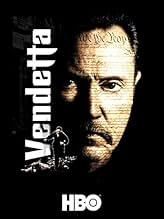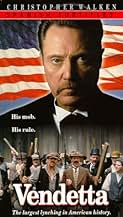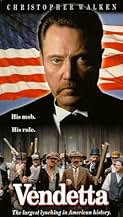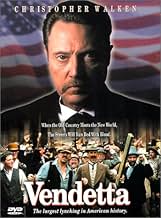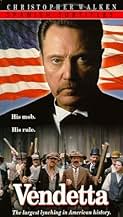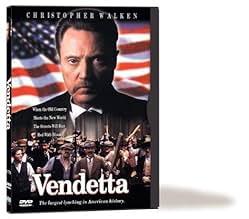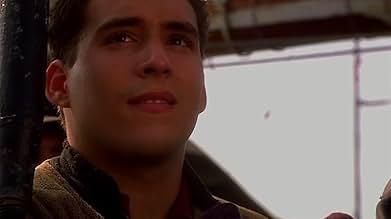IMDb RATING
6.1/10
1.4K
YOUR RATING
Based on a true tale of power, corruption and murder, Christopher Walken stars in the story of the largest lynching in American history...Based on a true tale of power, corruption and murder, Christopher Walken stars in the story of the largest lynching in American history...Based on a true tale of power, corruption and murder, Christopher Walken stars in the story of the largest lynching in American history...
- Director
- Writers
- Stars
George Martin
- Judge Baker
- (as George N. Martin)
- Director
- Writers
- All cast & crew
- Production, box office & more at IMDbPro
Featured reviews
Theodore Roosevelt was contemptuous of races and nations he considered inferior. When a mob in New Orleans lynched a number of Italian immigrants, Roosevelt thought the United States should offer the Italian government some remuneration, but privately he wrote his sister that he thought the lynching was "rather a good thing" and told her he had said as much at a dinner with "various dago diplomats . . . all wrought up by the lynching."
This was the attitude of America in 1891. The New York Times on March 14, 1891, published an article describing the events in this film with the following headline: CHIEF HENNESSY AVENGED; ELEVEN OF HIS Italian ASSASSINS LYNCHED BY A MOB. The attitude of the whites in New Orleans can best be summed up by the comments from one businessman, "I would rather have a thousand Chinamen, than one Italian.
This information is critical to understanding the movie, the truth of which is well documented. It was not just African Americans that suffered lynching after the Civil War, many Italians suffered the same fate across the country, but mostly in the South.
Timothy Prager's script hewed very closely to Richard Gambino's book. The performances were outstanding, particularly Christopher Walken, Joaquim de Almeida, and Clancy Brown, in the short time he was on screen. Alessandro Colla and Megan McChesney provided a romantic distraction amid the chaos. This was their only screen roles, and they did very well.
I am grateful to Alan DiFiore, Mark Israe,Sue Jett,Gary Lucchesi,Tony Mark, Nicholas Pileggi, and Gary A. Randall for making this important film.
This was the attitude of America in 1891. The New York Times on March 14, 1891, published an article describing the events in this film with the following headline: CHIEF HENNESSY AVENGED; ELEVEN OF HIS Italian ASSASSINS LYNCHED BY A MOB. The attitude of the whites in New Orleans can best be summed up by the comments from one businessman, "I would rather have a thousand Chinamen, than one Italian.
This information is critical to understanding the movie, the truth of which is well documented. It was not just African Americans that suffered lynching after the Civil War, many Italians suffered the same fate across the country, but mostly in the South.
Timothy Prager's script hewed very closely to Richard Gambino's book. The performances were outstanding, particularly Christopher Walken, Joaquim de Almeida, and Clancy Brown, in the short time he was on screen. Alessandro Colla and Megan McChesney provided a romantic distraction amid the chaos. This was their only screen roles, and they did very well.
I am grateful to Alan DiFiore, Mark Israe,Sue Jett,Gary Lucchesi,Tony Mark, Nicholas Pileggi, and Gary A. Randall for making this important film.
10cobram-1
No wonder this movie was never exhibited in theaters, after all, who would believe a Hollywood movie plot that doesn't portray Italians as belonging to the mafia? This movie is a good reminder that every group that has ever existed has had its problems and it's persecutors, and that the animosity usually boils down to economic reasons. Every group has something to be resentful about, the successful ones are those that put the past behind them and look to the future. I do have trouble with the title though, unless of course it was meant as an ironic title, since there was no Vendetta in the main plot. Christopher Waken stands out with another great performance, he is totally believable in his role, and his acting doesn't disappoint.
This movie could have been much better if it hadn't brushed over the personal lives of the characters, but I think the filmmakers had to decide on whether to concentrate on the factual story or an in depth character study of the immigrant experience. Had they decided to pursue both in this case it probably would have made an excellent mini-series
This movie could have been much better if it hadn't brushed over the personal lives of the characters, but I think the filmmakers had to decide on whether to concentrate on the factual story or an in depth character study of the immigrant experience. Had they decided to pursue both in this case it probably would have made an excellent mini-series
This was a fairly interesting historical drama, but the portrayals were so black and white that the story seemed improbable to me. I suspect the true story is a bit more "gray" than the movie suggests. Our politically correct society allows these one sided views only when the "white anglo saxon protestant" male is the villain.
This film is based on a real story of a century ago that probably is not in any of the New Orleans tourist brochures. Thirty thousand Italians were brought into New Orleans between the end of the Civil War and 1890 as a source of cheap labor to work on the docks and in the farm produce market. There is real money to be made and some of the most powerful men in the city resent the wealth of two Italians who have given their countrymen an incentive to be very productive. The police chief who won't go along with a takeover plot hatched by the mayor and the men who have put the mayor in power is assassinated. A group of Italians who are in the wrong place at the wrong time and the two wealthy Italian businessmen are framed. After the courtroom drama, there is an even more dramatic finale.
Vendetta is a tough film to watch without feeling sadness and outrage, but such is the stuff that HBO churns out, honest pieces of history that sting you with their refusal to honey coat or gloss over the nasty details (I'm looking at you, History Channel). This one takes place in 1890 New York City, a time of mass Irish and Italian immigration which spurred a ton of unrest among those already settled and raised in that area. Everyone is fighting tooth and nail for a piece of the pie and a chance to feed their families, and the ones with a bunch of pie just greedily want more. The influx of Italians is a cause for insidious worry for James Houston (Christopher Walken), an obscenely wealthy and deeply corrupt piece of schit. He's joined by equally nasty William Parkinson (Luke Askew), and Mayor Joe Shakespeare (Kenneth Welsh), as the trio cook up an evil scheme to implicate a few young Italian men in the mysterious death of a sympathetic and kindly Irish police chief (Clancy Brown). This sets in motion a tragic outbreak of riots and and angry acts of violence against the Italians. Even their union representitive Joseph Macheca (Joaquim De Almeida) cannot bring peace or stop what Walken and team have started. You may think why make a film of this, as it heads straight for the bleakest of resolutions, but I think it's important to shine a light on even the darkest patches of history, in order to understand the levels of deception and human cruelty so that we may see it coming before it's too late next time around. This was a terrible, terrible event and the film hits you square in the face with it's blunt truth and unwavering honesty. Kudos to HBO fpr taking it on. Watch for the late Edward Herrmann and Bruce Davison as rival lawyers in the chaos.
Did you know
- TriviaMany scenes were filmed in Market Square, City Hall, Ontario Street and the former Rockwood Asylum, all in Kingston, Ontario, Canada.
- GoofsThe Jack Daniels bottle O'Malley is pouring whiskey from is equipped with a modern day barcode.
Details
- Runtime
- 1h 57m(117 min)
- Color
- Sound mix
- Aspect ratio
- 1.85 : 1
Contribute to this page
Suggest an edit or add missing content



